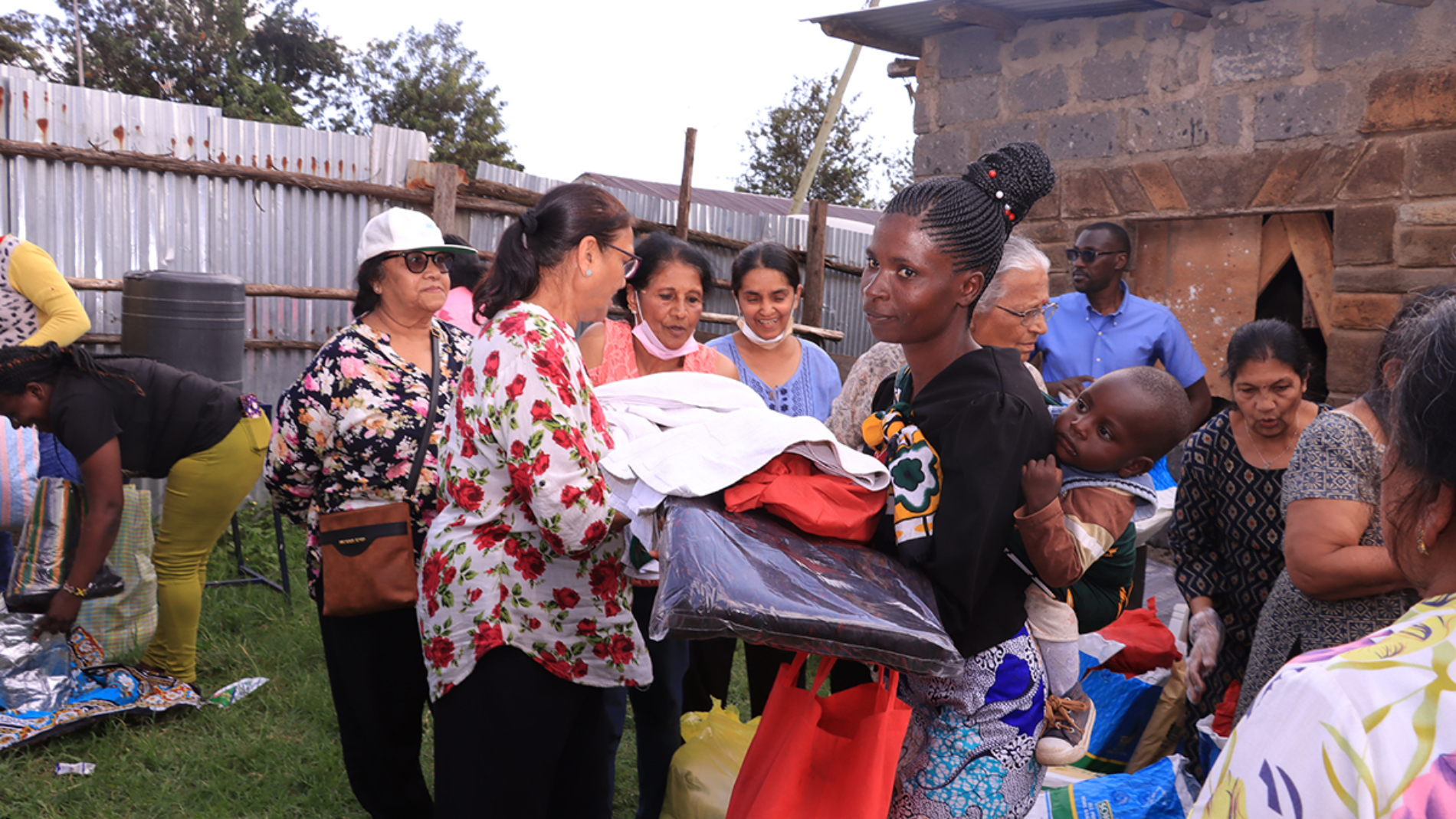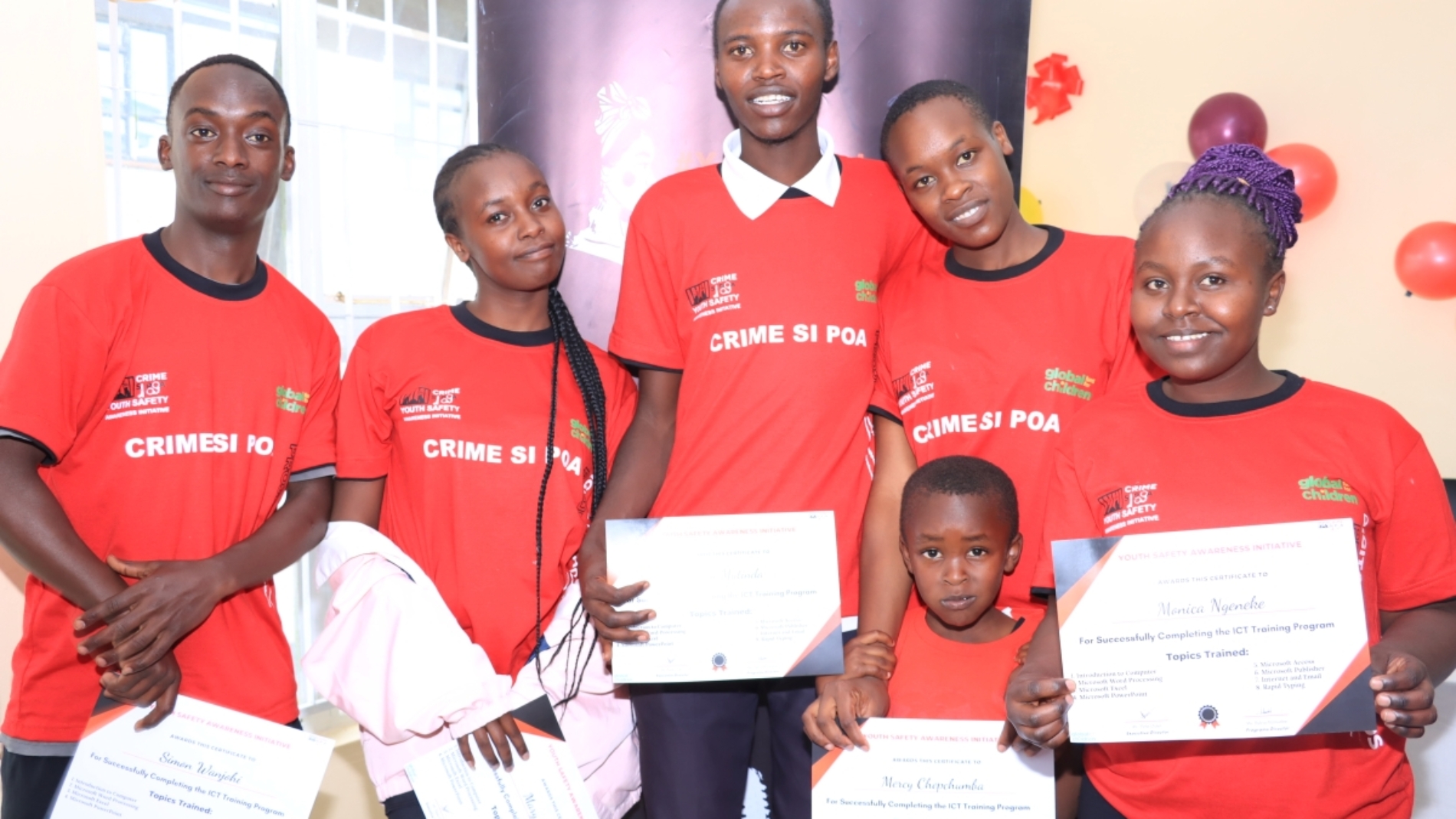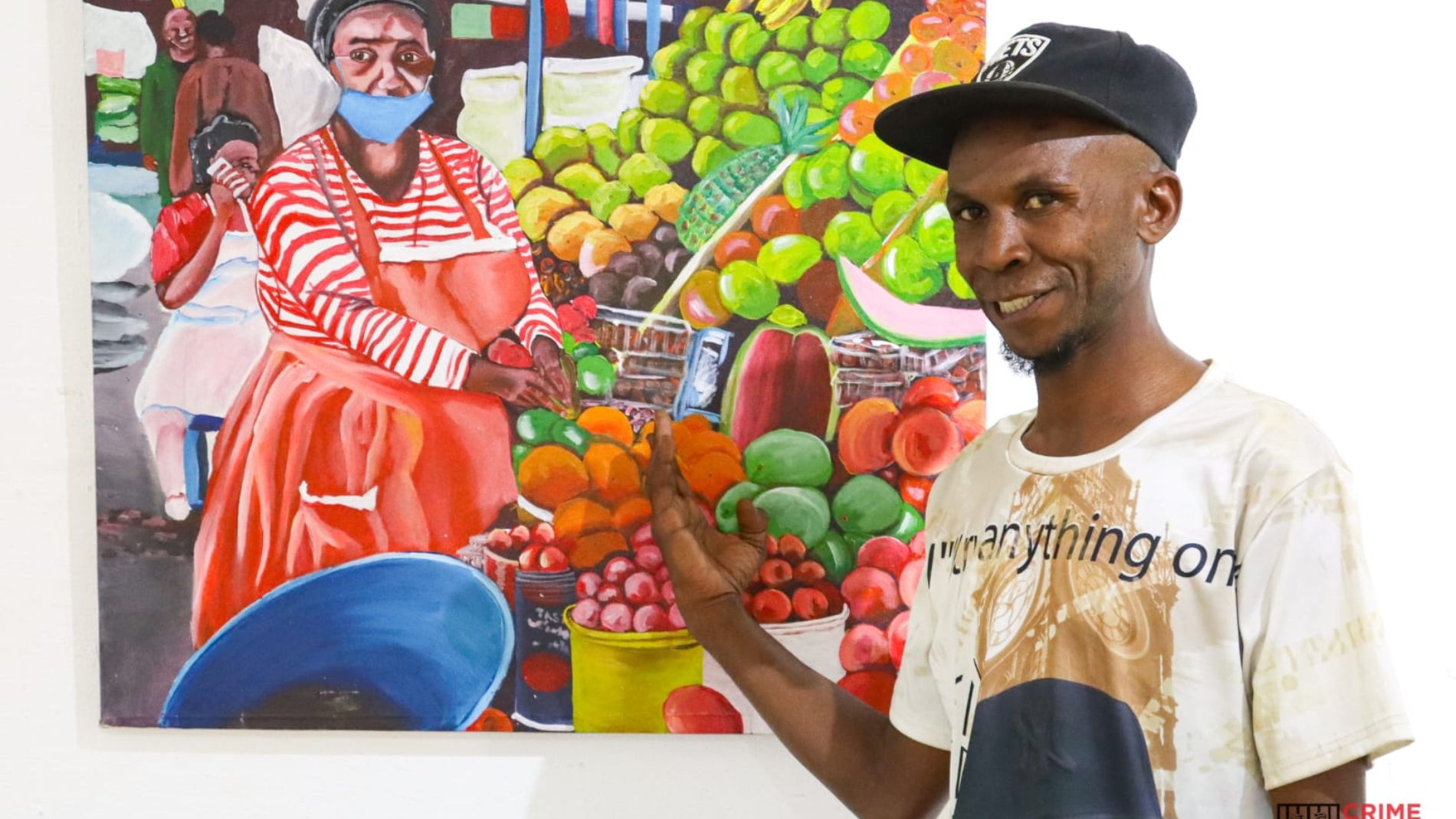Brian adjusted on the hard wooden bench, the familiar clanging of the prison gate echoing in his ears. The Crime Si Poa psycho-educational sessions were the closest he got to a glimpse of the life he’d so carelessly thrown away. Today, a story resonated with him, a cautionary tale about the blurred lines between love, consent, and the harsh reality of the law.
Cities on Edge: Youth Knife Crime on the Rise
Residents in Kondele, Migosi, Jua Kali and Obunga areas of Kisumu City are still reeling from a recent spate of an unexplained wave of theft, violence, and loss of lives executed by well informed and organized faceless gangs in the city involving the glint of a blade. It is the same story in sections of Mathare, Kariobangi, Eastleigh, Kawangware, and Dandora areas of Nairobi that have also witnessed a disproportionate level of the same crime.
TO THE RESCUE: Crime Si Poa and Oshwal Mahila Mandal Aid Flood Victims
The raging floods that have hit Kenya over the last two months, claiming 267 lives with 75 still unaccounted for, has exposed the struggle families living in underserved communities face in rebuilding their lives.
Digital Skills Transforming Lives in Kajiado
Youth unemployment is a critical issue that affects countless young people worldwide. In Kenya, the largest population of Kenyans falls under the youth bracket (18-35) at 75 percent according to the 2019 population census.
Unemployment rates among the youth are equally high given that more than one million graduates annually continue to add to the number of unemployed. It is a multifaceted problem with far-reaching consequences, not only for the affected individuals but also for society and the economy as a whole
This is a situation that Omar Hawa got caught up in 2022 when she cleared her form four. “ I wanted to study clinical medicine at Kenya Medica Training College (KMTC) but my grade (C-) limited me. My mother’s limited resources also contributed a great deal. Coming from a single-parent family made it tough for me,” says Hawa.
Being the second born in a family of three, Hawa says her elder brother had successfully finished college but had not secured any meaningful employment, equally making him dependent on their mother even as their younger sister was still in school.
Hawa says she was forced to stay at home a whole year, with the hope that she could get a sponsor to take her to college. “I had to shed off my desire to pursue medicine and accept anything that would come my way,” she adds
One day, as Hawa was wondering through Kajiado town where she resides, she overheard a conversation about an organization enrolling young people in a digital livelihood program, a course aimed at training them in various skills related to the digital world such as typing, data entry, computer literacy, and packages. It was an opportunity for the underprivileged youth to acquire marketable skills and secure decent jobs.
Hawa’s eyes lit up with hope. She knew that this might be her chance to build a better future for herself and her family. Without wasting any time, she rushed home to share the news with her mother. Despite her initial skepticism, the mother recognized her determination and agreed to let her enroll in the program.
The course was intense and challenging but was relentless in her pursuit of knowledge. She attended classes diligently, often staying up late to grasp complex concepts. She mastered the art of customer service, developing excellent communication and problem-solving skills.
After two months elapsed, Hawa among other 38 students graduated from the Digital Livelihood Program. She was proud of her achievement and couldn’t wait to apply her newfound skills.

“Am happy that by the time of graduation, I had secured employment as a receptionist in an organization based in Karen. As a side hustle, I now also type documents for people, do online writing, and apply for Kenya Revenue Authority (KRA) Pins for those who do know how to do it. This gives me extra cash to support my family, she excitedly says.
Digital Livelihood Project Officer at Crime Si Poa Ms. Phanice Kimutai says there is a great need to prepare the youth with digital skills as the world is moving towards digitalization. This, she says, helps them become innovative and stop relying on white-collar jobs. She adds that the program also encourages youth to volunteer in advocating against criminal behavior in their respective regions with the greatest motivation being to reach the entire community with anticrime messages.
“This is the 5th cohort we are training and graduating. So far, we have reached 135 youths in Kajiado county. As we equip them with digital livelihood skills, we are also working with them as volunteers to campaign against crime and sensitize the community on dangers, “she adds.
Speaking during the graduation ceremony, Director, of Youth Governance in Action Mr. Eugine Simiyu applauded Crime Si Poa’s initiative terming it a positive response towards embracing technology.
Simiyu added that ICT offers an exciting and diverse range of career opportunities for youth, a chance to be at the forefront of innovation, financial rewards, and the ability to make a meaningful impact in a rapidly changing world. “For young individuals interested in technology and willing to embrace lifelong learning, venturing into ICT can be a wise and fulfilling choice as it offers self-employment, exposes one to the global world in the comfort of their homes, and offers e-economic transformation.

Healing Hearts: A Psychologist’s Lifesaving Journey
In the depths of the COVID-19 pandemic’s mental exhaustion, Rebecah, a certified counselling psychologist from University of Nairobi, faced a profound challenge that tested both her training and compassion.
“I received information that a friend, grappling with a breast cancer diagnosis had contemplated suicide. The excruciating pain, the uncertainty of her prognosis, and the loss of her once-vibrant life had taken a heavy toll on her mental health. She felt like she had no control over her body or her life, and this hopelessness had led her to consider ending her suffering on her own terms,” she says.
After learning about her friend’s thoughts of suicide, Rebeca approached her with kindness and empathy. She began a series of one-on-one counseling sessions, creating a safe and nonjudgmental space for her to express her fears, frustrations, and feelings of hopelessness. She listened attentively, allowing the friend to share her innermost thoughts.

Throughout their sessions, Rebeca used a combination of therapeutic techniques, such as cognitive-behavioral therapy and mindfulness exercises, to help her friend manage her emotional distress. They worked on reframing negative thoughts, coping with the physical pain, and finding ways to regain a sense of control and purpose in her life, including seeking continuous treatment.
The bond between Rebeca and her had become incredibly strong, as they journeyed together through the depths of despair and emerged on the other side, where the will to live had triumphed over the desire to end her suffering. Rebeca’s unwavering support and therapeutic expertise had not only saved a friend’s life but had given her a reason to keep fighting, to cherish every day, and to find beauty even in the midst of illness.
Months later, as the pandemic waned, she gradually began to shift, seeing her life through a different lens and focusing on moments of joy and gratitude. She not only survived but thrived. Her cancer was conquered, underscoring the power of empathy and support even in the darkest of times. She is proud to have played a role in offering hope and healing to someone facing life-altering diagnoses, highlighting the lifeline that understanding and support can provide in the darkest hours.
This month being breast cancer awareness month, with theme “no one should face breast cancer alone’ World Health Organization states that 90 percent of early breast cancers are curable with treatments and self care. In 2022, Kenya’s Ministry of Health ranked breast cancer second in all deaths caused by cancer. In a statement the ministry said breast cancer records over three thousand deaths, noting that about seven women succumb to breast cancer daily in the country.
“Breast cancer accounts for over 3,107 deaths making it the second leading cause of all cancer deaths in the country. 7 women die every day in Kenya as a result of breast cancer,” the statement from the ministry stated.
Rebecca says the statistics can be reduced by giving proper care including mental health care to survivors. She also advocates for women going for screening to determine their status early enough.

But the journey to empathizing with people’s situations has not come easy. Rebeca says her first dream was to be a doctor as she grew up passionately helping out people with various medical conditions.Top of Form.
“After clearing my primary level, I joined Itoleka Girls secondary in Kitui where I excelled and got admission at University of Nairobi. However, due to some unforeseen circumstances, I got a letter to study psychology at the same institution. This was heartbreaking but I took it positively and, in the process, learnt that it actually had a mental health factor. I was happy that I would eventually provide health solutions to people,” she says.
After he completion, Rebecca secured a 6 months internship at a local mental health hospital in Nairobi where she encountered different cases, diligently working under the direction of professional doctors to help the survivors. At the end of her internship, she chose to work as a volunteer at Crime Si Poa (CSP), working under the prisons and reintegration programme, offering counselling sessions to inmates. It was while volunteering at CSP that she encountered her friend’s case.
Currently, Rebeca also provides counselling services to children under the community program at CSP. She visits schools and communities, offering mentorship to ensure that children are raised with moral values.Her determination and resilience in her field led us to honor her on this Mashujaa Day.
Ends.
Shadows of Innocence: A Journey Through the Backstreets.
It was on a Wednesday morning as the sun began its ascent over the horizon, casting a warm, golden glow that painted the sky in hues of orange and pink, I found myself on a journey into the heart of a backstreet joint of Majengo area in Githurai, Nairobi County.
I had heard whispers of its existence and activities after one of our partners from Community Pop John, Simone Ceciliani, gave me a chilling brief, a place where the vulnerable of society met and conducted their businesses in secrecy.
As Simione and I headed to ‘Kije’ place locally branded, the narrow pathway was dimly lit, and the air was thick with loud music from all directions. The tales of forgotten dreams and desperations were evident as we encountered an area of people living in the middle of a pub zone with commercial sex workers queuing at each entrance waiting for clients. Open sewer lines welcomed us as we put our body muscles to practice through the ‘hop, skip and jump’ motion. A mixed untold smell filled the air with children running around oblivious of the hazardous situation surrounding them.
My heart ached as I observed a group of young individuals huddled in a dimly lit corner. Their faces were etched with weariness, their eyes reflecting a myriad of emotions – pain, numbness, and a longing for escape. Despite the sorry state, the young men welcomed us as we engaged them in a conversation on the consequences of engaging in criminal activities and drug abuse.
“Life is so tough, some of us here have families but no jobs. Most of us dropped out of school because of poverty in our homes. We have been unable to secure anything meaningful. We don’t engage in stealing because we want to. If it were you, would you let your child sleep hungry when you can get it from someone else?” one of them posed. Well, I took time to digest that but at the same time did not want to judge him.
As our session in that particular place came to an end, and as we moved to the next street, we were signaled to pass by a base that was bushy and with houses built with iron sheets that were brownish in color, from a distance we could see smoke, but we were not aware what was happening. When we got close to the ratchet house, we were welcomed by some young men who were using drugs.
The room was fully packed with almost 40 young men between the ages of 20 to 30 years who were freely smoking Madibi (cocaine) as it is locally referred to. They would fill the powdered stuff into aluminum foil tubes and sniff it to the end. We could tell there was more than cocaine, they equally chewed khat and smoked cigarettes and bhang. The room also serves as a sleeping den during night hours as there was evidence of torn pieces of mattresses scattered all over
The same script of lack of employment and using drugs as an escape route showered our ears. They engage in all sorts of criminal activities to get money which they use to buy food for their families as well as restock their drugs.
The saddest part was the presence of a 5-year-old in the room. His innocence was snatched away too soon by the harsh reality of this environment. His fragile frame was a stark reminder that the destructive forces of substance abuse spared no one. The boy was placed next to a man sniffing “madibi” and releasing all the smoke in the atmosphere. The mother to the boy was idling around there looking shaggy with a piece of cloth covering her mouth while saliva flowed freely. She wore torn clothes, looked confused and sleepy, and could not utter a single word
As we continued with the engagement, giving them our assurance that we were harmless, stories of broken families, shattered dreams, and a sense of hopelessness that had driven them to the edge started coming out. The substances they sought solace in were a temporary escape from a world that had failed to provide them with alternatives.
As they spoke, it became evident that this backstreet had become a refuge for these young souls, a place where they found company amidst their shared struggles. Their tales revealed the systemic issues that had pushed them to this point – lack of access to education, limited job opportunities, and the absence of positive role models. It was a cycle that seemed impossible to break.
Yet, amid the darkness, glimmers of hope emerged. Some of these young individuals spoke about their dreams, their aspirations that had been buried but not forgotten. They yearned for a way out, for a chance to rewrite their stories. It was a poignant reminder that beneath the surface of despair, there were still sparks of resilience and determination.
The report by the National Authority for the Campaign Against Drugs (Nacada) released in May this year states that children as young as six years old are now abusing drugs, something that should be worrying the whole country. It is evident that many children have become passive smokers after being exposed by their guardians. The truth is that they eventually get addicted.
After a whole day of engagement leaving the backstreet, I carried their stories with me. They were stories of pain, yes, but also stories of strength and potential. The journey opened my eyes to the urgency of addressing the root causes of youth crime and substance abuse and providing support, opportunities, and a renewed sense of purpose.
My journey to the backstreet is a testament to the fact that even in the most challenging environments, there is an inherent desire for change. It is a reminder that behind the statistics and the stereotypes, there are real lives with real dreams. As I walked away from that backstreet, I vowed to amplify their voices and work towards a future where no child’s innocence is lost to the shadows of substance abuse. I however need partners on board to achieve this and save the future generation.
For a drug-free society, change begins with you, will you be able to be the voice to the voiceless by speaking and spreading informative messages to advocate against crime and drug abuse in your area?
My parting shot; The best way to predict the future is to create it together. – Joe Echevarria
NO Time For Excuses – Cynthia’s Story.
In the heart of the bustling city of Nairobi, where everybody migrates to look for opportunities, Cynthia Kawira has been hopeful of gaining meaningful employment having graduated from The Cooperative University of Kenya as a social worker in 2022.
As the days turned into weeks and weeks into months, Cynthia’s optimism began to wane. The job applications she sent out seemed to disappear into an abyss, and the few interviews she managed to secure ended with polite rejections.
She is among the growing youthful generation brimming with aspirations and ambitions but facing the unyielding tide of youth unemployment. She however did not get discouraged and decided to take up volunteer work to enhance her skills
“I took up the paralegal training offered by Crime Si Poa so that I can provide legal awareness to my community members rather than just sitting idle. I am now volunteering with the organization, conducting youth empowerment programs in Kajiado County; educating them on access to justice, crime, drugs and substance abuse, and environmental conservation. I look forward to specializing in counseling issues in legal law, emotional and psychological matters,” she says.
According to the Kenya National Bureau of Statistics (KNBS) report released early this year, the number of Kenyans without jobs increased to more than 2.97 million in the last quarter of 2022 from 2.89 million in the previous quarter, underscoring the labor market woes in the wake of elevated inflation and reduced activity in the dominant agricultural sector. The report states that more than half of the numbers are youthful population, underlining the growing crisis of youth unemployment in the country.
Speaking on Prime Time TV47 to commemorate this year’s International Day of Youth with the theme; Green Skills for Youth, towards a sustainable world, Cynthia underscored the fact that as much as colleges and universities were releasing many graduates in the job market, few are able to secure opportunities, and most end up in casual jobs.
“Most youths find it hard to accept that they are unemployed after studying hard and graduating, hence feel uncomfortable to work in areas not in their line of career. I, however, implore them to take up the jobs to develop their skills because the job market requires different skill sets; you never know where you may land. It also gives you an opportunity to learn leadership skills,” she said during the show
Cynthia, however, called on the government to review the education curriculum so that it is skills-based and promotes entrepreneurship rather than focusing only on passing exams. This, she said, would help in addressing the issue of youth unemployment.
At the same time, Crime Si Poa Executive Director, Mr. Peter Ouko, underscored the fact that youth need not consider skills acquired in technical studies at the polytechnics and vocational centers as inferior to what others learn in university. He encouraged them to take up the courses as the demand for technical jobs was high worldwide. He further called on the government to be consistent in youth-centric programs as lack of opportunities is what forces many youths into crime.

Having founded Crime Si Poa while in prison following a wrongful conviction, Peter said that 75 % of inmates belong to the youth bracket with some having been wrongfully convicted. “Crime Si Poa started through sensitization against crime from prison and we used our networks outside to reach out to the youth,” he added.
Noting that there is a need to create alternatives to address the issue of unemployment, he called on the government to simplify the process of the acquisition of passports so that many youths can seek and access opportunities in other countries.
Click this link to follow the complete interview: LIVE ||TV47 WEEKEND EDITION || TO THE POINT
Skills Empowerment Key in Addressing Crime Among Youth, says Peter Ouko, Crime Si Poa Executive Director
Serious violence has doubled, and many young people are dying due to crime related acts including drugs and substance abuse. While law enforcement is an immediate response to this epidemic, creating space for youth to gain employability or entrepreneurship skills is key in addressing the challenge.
A report released in May 2023 by The National Authority for the Campaign against Alcohol and Drug Abuse (NACADA), reveals that children as young as six years old are suspected to be engaged in drugs and substance abuse. The report shows an increased consumption trend among the youth.
On other crime related activities, data from the Kenya National Bureau of Statistics, put the number of jobless and idle youth in Kenya at around 3.5 million, indicating they are frustrated and more vulnerable to criminal activities.
Reports indicate that most young people are able to attend primary but drop out in high school due to poverty. According to the United Nations Educational, Scientific and Cultural Organization (UNESCO), 30 per cent of the adult population in Kajiado County is unable to read and write. This means that many young people do not gain proper skills for employment once they drop out at the primary level.
Crime Si Poa has been building the capacity of young people on digital livelihood and soft skills in Kajiado county to improve their employability and ability to run their businesses.
“A strong aspect of our work is linking and preparing young people for gainful employment through entrepreneurship skills. With the world moving towards digitization, we work to provide them with competitive skills which improve their employability and income in the long-run. This, in turn, lowers the financial frustrations on the young people and reduces the likelihood of them getting into crime related activities.” says Mr. Peter Ouko, Executive Director at Crime Si Poa.
“We have targeted 30 youth in this Cohort 5, who will go through a 2-month training curriculum which will equip them with basic ICT skills, soft skills, and other employability skills. So far, we have trained 91 (cohort 1 to 4) youth in Rongai with more than half of them currently in employment and entrepreneurship while some went back to school to advance their skills,” says Ms. Phanice Kimutai, IT Lead, and Digital Livelihoods Officer at Crime Si Poa.

“We are seeking partnerships with organizations that can absorb these young people who have gone through the training, either offers them employment or hands-on skills through internship programmes,’ says Irene Were, Crime Si Poa Programmes Manager for community engagement, adding that the students will be awarded certificates of completion.
From Trauma to Triumph: How CSP Mentorship has become Life-changing.
Jane’s* (not her real name) life had come tumbling down like a pile of blocks following a rape incident. “I was walking home from a friend’s place when a motorbike rider accosted me, pounced on, and raped me. I just wanted to die,” she said during the interview.
Today, Jane has gone through training in both soap making and bead ornaments, which she sells to the community, giving her a tangible income thanks to the Crime Si Poa mentorship program.
Jane suffered depression following the incident, becoming an alcoholic who harbored suicidal thoughts. She had refused to seek medical assistance following the incident that had left her traumatized, which worried her mother. “That is how we got to meet with the mother who shared the concerns with me,” says Rachel Mumbu, a trainer and mentor at Crime Si Poa who was conducting one of the community training courses on soap making. Rachels says Jane’s story was horrifying, and she needed urgent help.
After persistent persuasion, Jane won Rachel’s trust, opened -up, and was taken through counseling sessions. “The uphill task was to make her feel safe around me and allow me to walk the journey with her,” narrated Rachel.
The now-turned-counselor convinced Jane to allow a third party, Halima Guyo, Crime Si Poa Organization Kajiado County Project Officer, to assist her. They eventually took her to the hospital, where she received treatment and further counseling to overcome the trauma and suicidal thoughts.
She was later introduced to detergent and bead ornament-making as part of her healing process and as a source of income. Her transformation journey was remarkable.
Out of 175 countries, Kenya is ranked 114th in the World Population Review, placing it among the nations with high suicide cases globally. Rape has been described as a cause of traumatic experience that causes long-term outcomes, including psychological and social realms of survivors, which may end in suicidal thoughts.
Crime Si Poa has been creating community awareness to eradicate crime-related activities like rape, SGBV, FGM, and drug and substance abuse. The organization also conducts mental health awareness forums and economic empowerment programs that have enriched survivors such as Jane, giving them a second chance.
From Mukuru to Oxford.
James Mutugi Wangechi is not a known name, not famous, at least not by the standards of fandom in the country. He is little known now, even in his neighborhood. That notwithstanding, he is on a mission to change the world with his hands, canvas, and some paint.
“I hail from a small slum called Mukuru Kayamba in Nairobi, Kenya. My family was dysfunctional, and it saw me get all the multifaceted person you see today.”
James started schooling at Pumwani high school, a journey he reminisces with nostalgia and some not-so-pleasant memories. He was from a dysfunctional family, not the normal one where one parent is active and the other is not; he was different. All the parents were absent! He had t learn the survival tactics all alone.
His relatives seeing how he was struggling with school and being alone with his mother, who was a drug addict decided. “ I was taken to a children’s home by an aunty who saw the agony and struggles that I was going through; I felt relieved for the moment.” His love for art was birthed here. He started with simple sketches, but it did not last long.
His cheeky behavior made him fall into the children’s home, and he ran away from class seven just before he sat for his primary education. “ I went to stay with my aunty, who had taken me to the children’s home. Although not well off, she managed to take me in,” he said. His love for art made him a name at Pumwani, where he attended his secondary school, and he said that he made money from skills that helped him offset some of his school fees in the first and second forms.
His delinquent side would catch up with him immediately after completing his high school education. He got into crime, and his aunty had to throw him out. “ I was a grown-up now, and I gave her no other option. She did what she could to protect herself and her kids.” He had nowhere to call home, and that’s how he ended up being a street-connected family. He continued his street criminal activities until the law caught up with him. He was sentenced to 10 years. This is where he met his longtime mentor Peter Ouko, the founder of Crime Si Poa, who counseled him against crime.
Like we all do when faced with adversaries, he needed a distraction, and his hope lay in the canvas and papers. It kept him going. “Canvas was like my therapy and the rehabilitation that I needed in my life; it embraced me” His inborn talent embraced him, and he started doing artwork seriously.
Today he paints to talk about police brutality, prevalent in African informal settlements, and social inequalities affecting the community. “I have also painted some of my life experiences and life happenings to those around me. My paintings are exhibited at the Kenya National Museum and Mukuru art club in Makadara constituency in Nairobi,” he noted. At 40 years of age, his paints have received global recognition and will be presented at Oxford University for a death penalty project workshop and conference.
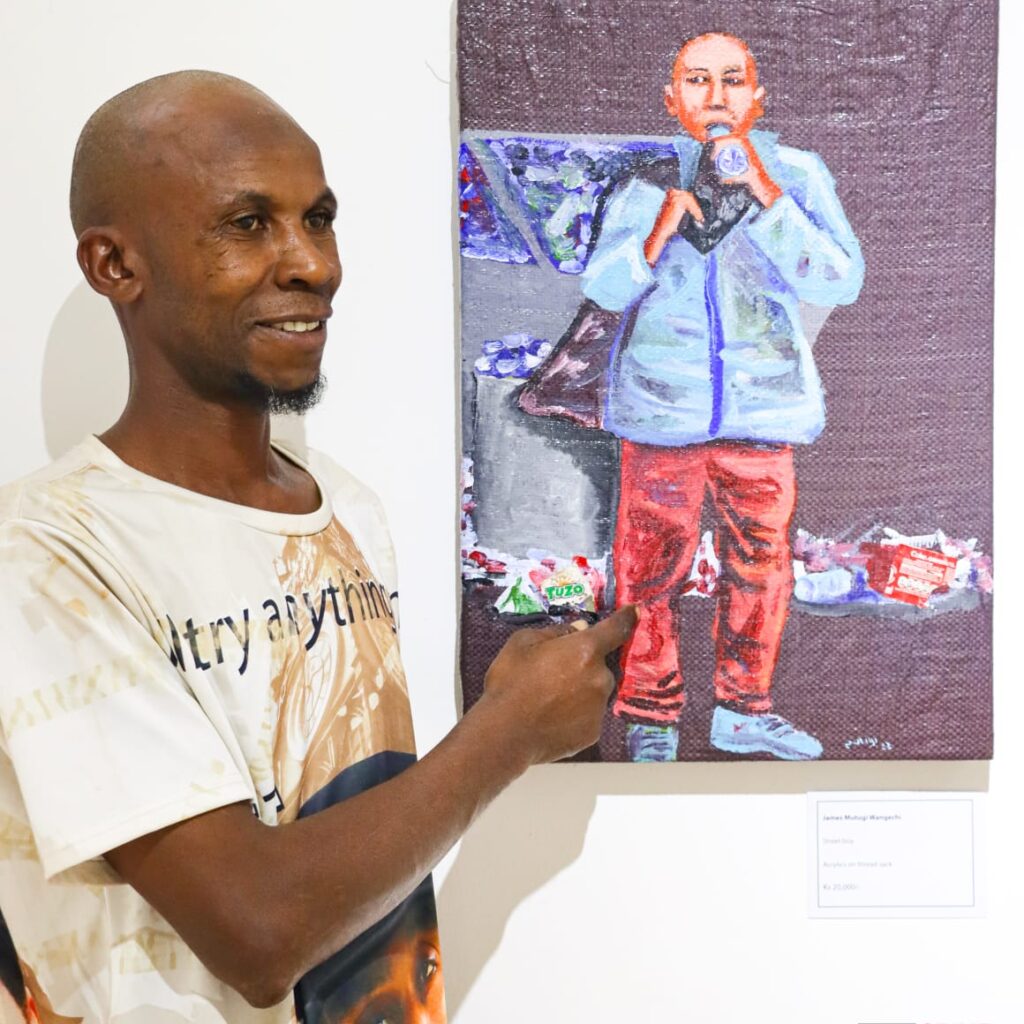

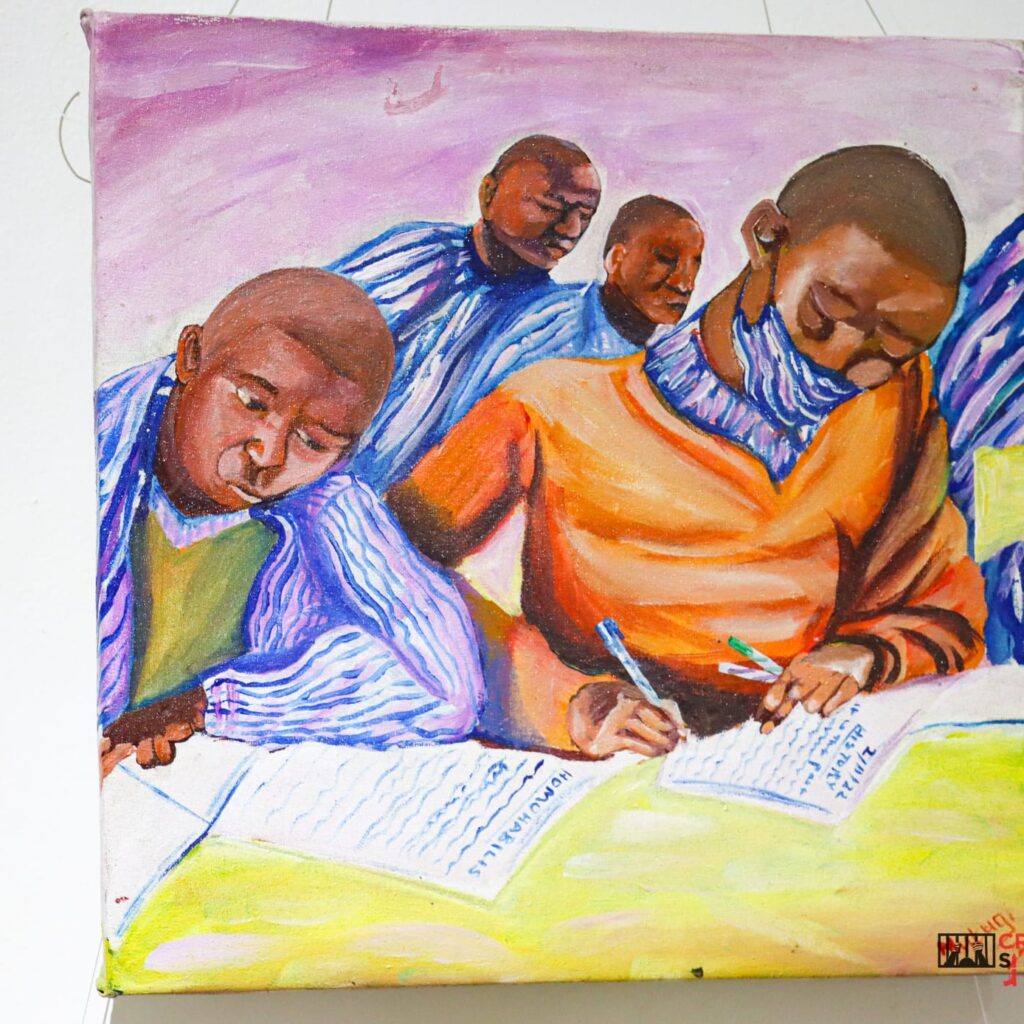

He noted with apprehension that the Kenyan artworks are not yet entirely accepted as people perceive them as a rich man’s affair. “One day, you could be making a killing but then spend the next following months with no sales whatsoever. People who love and appreciate art buy for they know its worth. I would, however, love to see more people come and support the course,” said Mutugi.
In his free time, he mentors young and talks to young people about crime. Mutugi has been a crusader and grand champion of crime-free societies. He thanks Crime Si Poa for all the support he received in referrals and psychosocial counseling before being reinterrogated in the community.
As we left his museum, he also excused himself to go to another exhibition he was eyeing at Alliance Française; he is a man on a mission.



